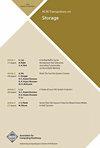KVRangeDB: Range Queries for a Hash-based Key–Value Device
IF 2.6
3区 计算机科学
Q3 COMPUTER SCIENCE, HARDWARE & ARCHITECTURE
引用次数: 2
Abstract
Key–value (KV) software has proven useful to a wide variety of applications including analytics, time-series databases, and distributed file systems. To satisfy the requirements of diverse workloads, KV stores have been carefully tailored to best match the performance characteristics of underlying solid-state block devices. Emerging KV storage device is a promising technology for both simplifying the KV software stack and improving the performance of persistent storage-based applications. However, while providing fast, predictable put and get operations, existing KV storage devices do not natively support range queries that are critical to all three types of applications described above. In this article, we present KVRangeDB, a software layer that enables processing range queries for existing hash-based KV solid-state disks (KVSSDs). As an effort to adapt to the performance characteristics of emerging KVSSDs, KVRangeDB implements log-structured merge tree key index that reduces compaction I/O, merges keys when possible, and provides separate caches for indexes and values. We evaluated the KVRangeDB under a set of representative workloads, and compared its performance with two existing database solutions: a Rocksdb variant ported to work with the KVSSD, and Wisckey, a key–value database that is carefully tuned for conventional block devices. On filesystem aging workloads, KVRangeDB outperforms Wisckey by 23.7× in terms of throughput and reduce CPU usage and external write amplifications by 14.3× and 9.8×, respectively.KVRangeDB:基于哈希的键值设备的范围查询
关键价值(KV)软件已被证明可用于各种应用程序,包括分析、时间序列数据库和分布式文件系统。为了满足不同工作负载的要求,KV存储经过精心定制,以最佳匹配底层固态块设备的性能特征。新兴的KV存储设备是一种很有前途的技术,既可以简化KV软件堆栈,又可以提高基于持久存储的应用程序的性能。然而,在提供快速、可预测的输入和输出操作的同时,现有的KV存储设备本身并不支持对上述所有三种类型的应用程序都至关重要的范围查询。在本文中,我们介绍了KVRangeDB,这是一个软件层,可以处理现有基于哈希的KV固态磁盘(KVSSD)的范围查询。为了适应新兴KVSSD的性能特征,KVRangeDB实现了日志结构的合并树键索引,该索引可减少压缩I/O,在可能的情况下合并键,并为索引和值提供单独的缓存。我们在一组具有代表性的工作负载下评估了KVRangeDB,并将其性能与两种现有的数据库解决方案进行了比较:一种是Rocksdb变体,用于KVSSD,另一种是Wisckey,一种是针对传统块设备精心调整的关键值数据库。在文件系统老化的工作负载上,KVRangeDB的吞吐量比Wisckey高23.7倍,CPU使用率和外部写入放大率分别降低了14.3倍和9.8倍。
本文章由计算机程序翻译,如有差异,请以英文原文为准。
求助全文
约1分钟内获得全文
求助全文
来源期刊

ACM Transactions on Storage
COMPUTER SCIENCE, HARDWARE & ARCHITECTURE-COMPUTER SCIENCE, SOFTWARE ENGINEERING
CiteScore
4.20
自引率
5.90%
发文量
33
审稿时长
>12 weeks
期刊介绍:
The ACM Transactions on Storage (TOS) is a new journal with an intent to publish original archival papers in the area of storage and closely related disciplines. Articles that appear in TOS will tend either to present new techniques and concepts or to report novel experiences and experiments with practical systems. Storage is a broad and multidisciplinary area that comprises of network protocols, resource management, data backup, replication, recovery, devices, security, and theory of data coding, densities, and low-power. Potential synergies among these fields are expected to open up new research directions.
 求助内容:
求助内容: 应助结果提醒方式:
应助结果提醒方式:


